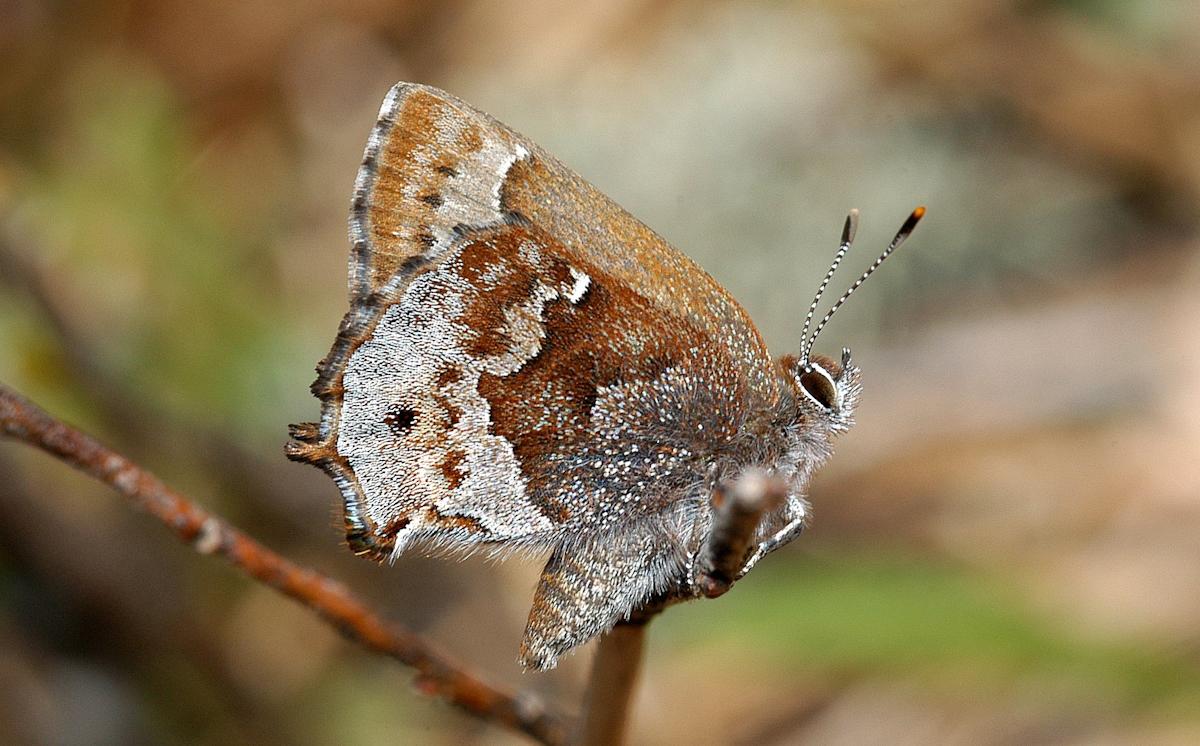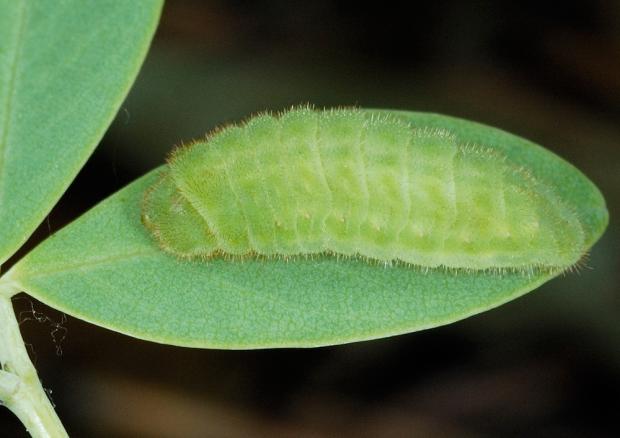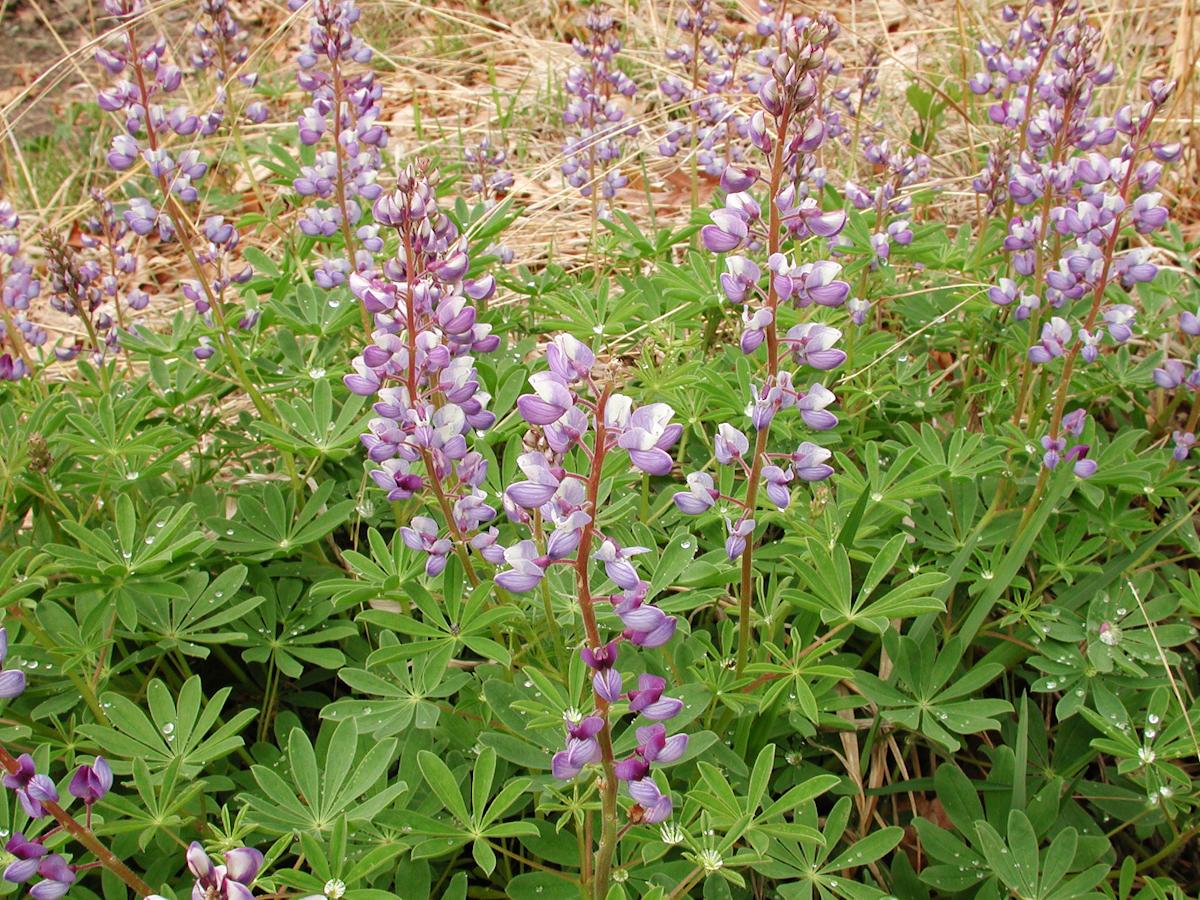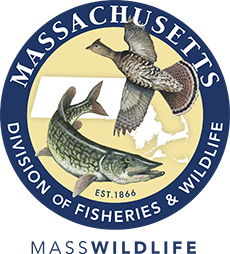- Division of Fisheries and Wildlife
- MassWildlife's Natural Heritage & Endangered Species Program
Media Contact
Media Contact, MassWildlife

You could call the frosted elfin picky. These small, brown butterflies will only lay eggs on two types of plants: sundial lupine (Lupinus perennis) and yellow wild indigo (Baptisia tinctoria). The frosted elfin, designated as a Species of Special Concern in Massachusetts, is only found at about two dozen sites across the Commonwealth. Unlike wide-ranging butterflies such as the monarch, frosted elfins live in localized colonies and most individuals never leave the habitat occupied by previous generations. Thanks to decades of effort by MassWildlife to propagate sundial lupine and restore wildlife habitat, staff are pleased to announce the recent discovery of a frosted elfin caterpillar at Montague Plains Wildlife Management Area (WMA), approximately one mile away from the nearest known population.
Montague Plains WMA is located in Montague, Massachusetts. The area contains the largest inland pine barrens habitat in the Commonwealth and is characterized by an open tree canopy and lots of shrubby undergrowth. The deep, coarse glacial sands that underlay the area give rise to its unique features and the specialized plants and animals that live there. Periodic fires are necessary to maintain many pine barrens plants. When MassWildlife acquired the bulk of Montague Plains WMA in 1999, decades of agricultural plowing and subsequent abandonment, along with wildfire suppression, had almost completely inhibited the unique characteristics of pine barrens habitat. Only a few scattered patches of unplowed land contained remnants of a more diverse habitat and native plants.
One of the primary threats to the frosted elfin is habitat loss. Prescribed fire promotes the growth of lupine and wild indigo and maintains the open habitat needed by both the frosted elfin and its food plants. For the past two decades, MassWildlife has been actively working at Montague Plains to restore and maintain pine barrens habitat through prescribed fire, tree cutting, and mowing.
“The unique barrens habitat at Montague Plains WMA is considered regionally and globally rare, making our restoration efforts at this site especially important for rare animals and plants that require this special habitat type,” says Brian Hawthorne, MassWildlife’s Habitat Program Manager. “It is incredibly rewarding to see decades of effort paying off.”
As part of the restoration process, biologists located a few small remnants of sundial lupine at Montague Plains WMA and adjusted management actions to favor lupine growth. Staff also collected seeds from lupine and from little bluestem grass in the area and gradually worked to expand existing patches of these valuable native plants. Thanks to careful restoration work, the original ¼-acre remnant of little bluestem near one of the lupine patches has expanded to cover nearly 20 acres.
Multiple biological surveys at Montague Plains WMA have shown that habitat restoration efforts are working. There is now an abundance of barrens plants including wild lupine, New Jersey tea, scrub oak, and low-bush blueberry. Uncommon and rare moths, butterflies, native bees, and reptiles—like the eastern hognose snake and eastern box turtle—are benefiting from this vibrant growth. Birds like the whip-poor-will, eastern towhee, prairie warbler, American woodcock, and ruffed grouse are making homes here and their numbers are increasing. More common species like black bear, white-tailed deer, and wild turkey are also taking advantage of the plentiful food and other habitat features created.
Learn more about MassWildlife’s efforts to restore habitat.
Learn more about the frosted elfin.
Sundial lupine



